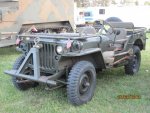@DREAD KT - I don’t understand your comment, “I can always get a CDL later.”
I view Texas driver’s licenses as having two aspects: 1) a class (e.g., Class C, B, A); and 2) commercial or non-commercial status.
Class is determined by the vehicle or, more specifically, the gross vehicle weight rating or gross combination weight rating of the vehicle.
There appears to be a presumption that operators of Class A and B vehicles in Texas will have a commercial driver’s license (“CDL”) status unless they meet one of the 8 exemptions listed in the document you linked to. If an exemption is met, then the operator’s license may be a Class A or B non-CDL.
I believe that legal operation of a 5-Ton truck in Texas requires a Class B license (or a Class A license if towing a trailer with a gross vehicle weight rating of more than 10,000 lbs). This could be either a Class B CDL or (if an exemption is met) a Class B non-CDL.
Lastly, I understand that the testing requirement for a Class B CDL is the same as a Class B non-CDL (I could be wrong on this). There are some differences such as annual medical testing requirements.
I want to get a Class A license. I’m undecided on CDL versus non-CDL. I would qualify for an exemption if I got the non-CDL solely to drive my former military vehicles. But, a CDL would give me more flexibility if I choose to drive other vehicles.
So back to my initial statement - I don’t understand your comment. Are you planning to take the test for a Class B or A license and then claim an exemption for non-CDL status? Why not get a CDL (again I’m assuming that the test is the same for the CDL and non-CDL). I’m curious what your perspective is as I’m still trying to make up my mind.


